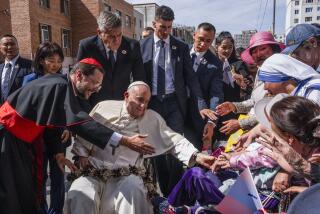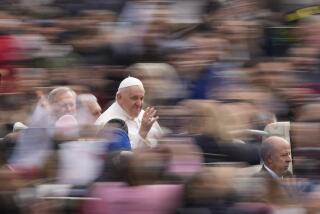Vatican and Bulgaria Establish Full Ties : Diplomacy: Renewal marks the formal end of the Eastern Bloc’s anti-religious era.
VATICAN CITY — The Vatican established full diplomatic relations with Bulgaria on Thursday, nine years after Bulgarian intelligence agents were linked to an assassination attempt that nearly killed Pope John Paul II.
The renewal and upgrading of ties broken after the arrival of hard-line communism in Bulgaria in 1949 marks the formal end of an anti-religious era in Eastern Europe: Bulgaria is the last of the Warsaw Pact nations to resume relations with the Holy See.
The Vatican of Polish Pope John Paul marked the historical event with a terse five-line statement at the end of its daily news bulletin saying that the Holy See and Bulgaria, “desirous of promoting mutual friendly relations, have decided to establish diplomatic relations.”
Bulgaria will name an ambassador to the Holy See and the Vatican a papal nuncio with residence in the Bulgarian capital of Sofia, the first time there have been relations at a full ambassadorial level.
In the 1930s, the major church presence in Bulgaria was Archbishop Angelo Roncali, who later became Pope John XXIII. But relations between the Vatican and a nation of 9 million in which there are about 70,000 Catholics of Latin and Byzantine rites were broken when the Communist government refused to allow the Vatican’s chief diplomat, an “apostolic delegate,” to return to his post in Sofia.
In January, 1950, the Bulgarians expelled the Vatican’s last diplomat. In a savage purge, thousands of Latin rite Catholics and priests were imprisoned and all church property expropriated. Of three Catholic bishops in Bulgaria when the crackdown began, one was shot and the other two died in prison.
“Now this church, too, can come out of the catacombs,” said a Vatican statement recounting the vicissitudes of Catholicism in a country where most people are nominally of the Bulgarian Orthodox faith. A large Muslim community was also systematically persecuted under die-hard Communist rule that succumbed last year to a democratic rebirth throughout Eastern Europe.
Relations between the Vatican and Bulgaria reached a particularly low point after the May, 1981, assassination attempt on Pope John Paul II.
After the shooting in St. Peter’s Square, the Pope’s captured assailant, Mehmet Ali Agca, a Turk, claimed to have worked under direction of Bulgarian and Soviet intelligence agents. The Bulgarian government denied any involvement.
Italian prosecutors formally alleged a Bulgarian and Soviet plot against the Pope, but a court in Rome acquitted three Bulgarians for lack of evidence. Agca is serving a life sentence in Italy.
During the Cold War, the Vatican worked quietly behind the scenes to keep at least some vestige of its church alive in Eastern Europe.
In the last year, the Vatican has resumed relations with Poland, Hungary, Czechoslovakia, Romania, and now Bulgaria, as well as the Soviet Union. The Vatican never acknowledged the division of Germany, so relations were theoretically never broken, although religion was no more welcome in East Germany than in the other Warsaw Pact countries.
John Paul, who has already visited Czechoslovakia as well as his native Poland, will travel to Hungary next year.
More to Read
Sign up for Essential California
The most important California stories and recommendations in your inbox every morning.
You may occasionally receive promotional content from the Los Angeles Times.










